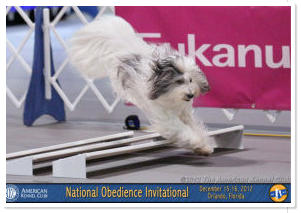




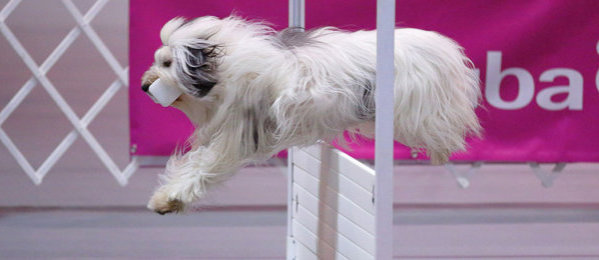
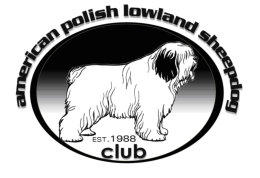
Home of Polish Lowland Sheepdogs
Obedience
The Wonderful World of AKC Obedience Competition;
An Overview of Traditional Obedience Trials
By Debbie Snyir (2007)
A title is nothing less then the permanent record of love given and received.*
What better way to show the bond of love and respect between dog and handler then by spending time in training and
showing for obedience titles. The first dog I ever trained was my mother’s miniature dachshund, Gretchen. Gretchen
followed my mother around constantly and slept in bed with her. When my mother was sitting down, Gretchen could always
be found sitting in her lap. Then I joined a 4-H group when I was about twelve and decided to participate in the dog training
class. Gretchen (as the family’s only dog) was the designated trainee. Within a few weeks of daily training sessions,
Gretchen, who appeared less than thrilled with the actual training, was waiting at the door for me to arrive home from school.
She sat with me while I did my homework and slept in bed with me, much to my mother’s dismay! All of us were amazed at
how much the bond between Gretchen and I grew as her training progressed. That is one of the things that got me hooked
on training and competing with my dogs over the years. My mother finally got her dog back when I got a dog of my own, an
OES named Chrisy (Lady Chrysanthemum CD, Can. CD). After Chrisy I owned, trained, and competed with a sheltie then a
series of Border Collies (can you tell I love those herding breeds?) Now I’ve come almost full circle. Instead of an OES this
time though, I’ve downsized and now I’m the proud owner of my first PON, Stella. I can see already that with Stella (AKA
Miss Opinionated) it’s going to be very important that I work hard to foster and maintain that bond of love and respect that
obedience training helps to create.
AKC obedience trials have been in existence since 1936. They were
created to show the dog’s usefulness as companion to humans by
demonstrating the dog’s ability to perform certain skills upon command. In
traditional obedience competition there are three levels of difficulty, each
with its own set of skills, or exercises. To earn a title at each level a dog
must pass, or “qualify” with a score of at least 170 out of 200 three times
under three different judges.
The first class is Novice where a dog and handler team earns a Companion
Dog title or a CD. In Novice the dog demonstrates his ability to perform the
basic obedience skills - heeling on and off leash including a figure 8 around
two strangers, a stand stay with a simple exam by the judge, a recall
exercise, a group sit stay for one minute and a group down stay for three
minutes. In both the sit stay and the down stay, the handlers are across the ring, about 40 feet from their dogs.
Once the dog earns a CD, he may move up to the Open class where his jumping and retrieving abilities are put to the test.
From the Open class a dog can earn a Companion Dog Excellent title or CDX. Again, the heeling skills are tested, but this
time all the exercises are performed off leash. The Open recall is more challenging then Novice because the dog is required
to drop when halfway to the handler. Dumbbell retrieves are performed both on the flat and over a jump. A broad jump is
the last of the individual exercises. The group exercises are longer then in Novice, with the sit stay for three minutes and the
down stay for five minutes. In the Open groups the handlers leave the dogs, walk out of the ring and remain out of sight. It
is quite impressive to see line of up to 12 dogs of all different breeds lying quietly with no handlers in sight!
The Utility class is the most challenging level because the dog is working at a greater
distance from the handler and must have the confidence to make decisions during each
exercise. From this class a Utility Dog title or UD is earned. Heeling skills are again
demonstrated, but this time as part of the signal exercise in which no verbal commands are
given, and at the end of heeling the dog must follow the handler’s signals (from across the
ring) to lie down from a stand, then sit up, and finally come to the handler. In the scent
discrimination exercise, four metal and four leather articles are scented by a stranger and
spread in a circle along with one article which the handler has scented. The dog must use
his nose to find the article belonging to his handler. This is performed twice - with both
metal and leather articles the handler has scented. In the directed retrieve exercise the
handler signals the dog to retrieve one of three gloves spaced across one end of the ring.
In the Utility stand for exam exercise the handler gives the dog a signal to stand stay while
they are heeling and, without stopping, leaves the dog to be examined by the judge. The
exam is similar to one performed in the breed ring. After the exam, the handler calls the
dog back into heel position. In the directed jumping exercise, the dog is commanded to
leave the handler’s side and run to the far end of the ring where the handler will command
him to sit. Picture a clock with dog and handler at 6:00, the dog leaving his handler and
running to 12:00. At 3:00 and 9:00 are a high jump and a bar jump. The handler signals the
dog to jump first one, resends him across the ring, and then signals the dog to jump the other jump.
After a team earns a UD title, they may continue to compete and earn more titles. Continuing to compete in Open and Utility
and passing both classes on the same day a total of 10 times earns a Utility Dog Excellent title, or UDX. The most
prestigious title is an Obedience Trial Champion or OTCh. To earn this title a dog with a UD competes in Open and Utility
and must place first through fourth and earn points based on how many dogs were defeated in the class. A total of 100
points including three first places must be earned for an OTCh.
One of the things I love the best about obedience competition is that everyone has the opportunity to bring his own goals to
the ring and achieve success. Whether you want a CD or an OTCh; green qualifying ribbons or blue and gold High in Trial
ribbons; the youngest PON to earn a CD or the first PON to earn a UDX, you can work for - and achieve - that goal.
*From the Fall 2007 issue of The Herder article “What is a Title Really”, author unknown
Addendum (2013):
Stella is now 6 years old, how time flies! She has taught me so much
about training dogs and how different dogs learn. Stella is extremely
smart (as I am convinced all PONs are) and learns things very quickly.
When my Border Collies have a toy she wants, she’s been known to go
find another toy and make it look like so much fun to play with, they drop
her real ‘heart’s desire’ which she immediately snatches up!
I have found that what I teach Stella in the beginning is what she remembers, so I’d better teach it correctly from the start. If
I don’t and try to change it later, she tells me “but MOM, you said I’m supposed to do it THIS way!” I have had to be very
careful because what I THINK I am teaching her may not actually be what she is LEARNING! When I taught her to leave my
side without a sit for a scent retrieve, SHE learned to leave my side without a sit for ALL retrieves (very smart on her part but
not what the obedience judges are looking for)
One of Stella’s accomplishments is being the third PON for finish a Utility Dog (UD) title.
This is the highest level of difficulty in AKC obedience competition. Once that level is
achieved, continued competition at that level can earn you various advanced titles: She is
first PON to earn an Obedience Master title by earning points based on scores earned in
Open and Utility competition. To earn those points she has to earn scores of 190 and
above out of a possible 200. Also she is over half way to a Utility Dog Excellent title,
which requires qualifying in Open and Utility classes at the same trial 10 different times.
Stella currently has done that 6 times. Stella is the first PON to earn an AKC all breed
Highest Scoring Dog in Trial award. This prestigious award is similar to a Best in Show
award, given to the dog who has the highest score in ALL the classes combined,
competing against all breeds. She has had the honor of being invited to the 2012 and
2013 AKC Obedience Invitationals, an annual event where the very best obedience dogs
of each breed come together to compete for the title of National Obedience Champion.
Even better then all those accomplishments, Stella is a wonderful companion and never
far from my side. I can take her to work with me in the Nursing Home where she is
always willing to entertain with her repertoire of tricks and give out gentle kisses. She is
truly my best friend, often seeming more human than canine!
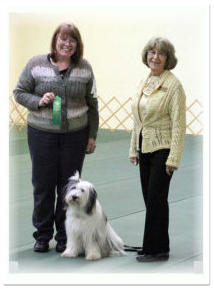
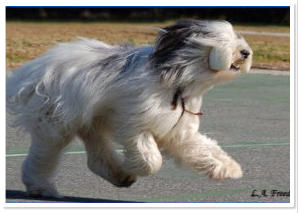
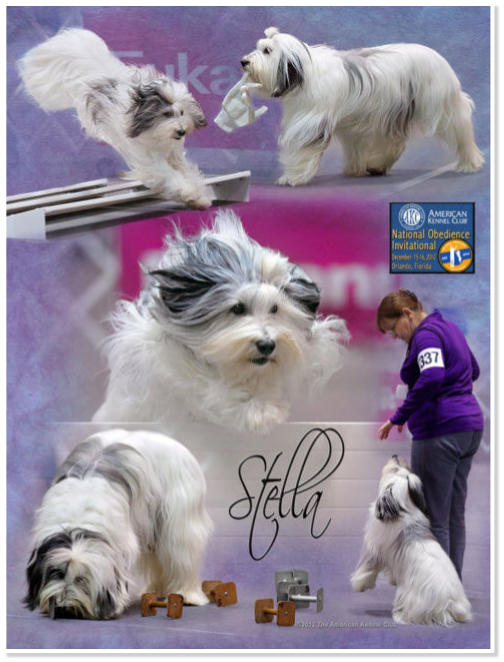
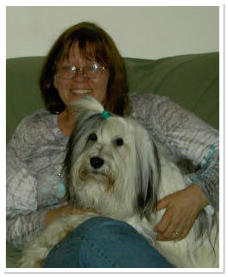
American Polish Lowland Sheepdog Club
